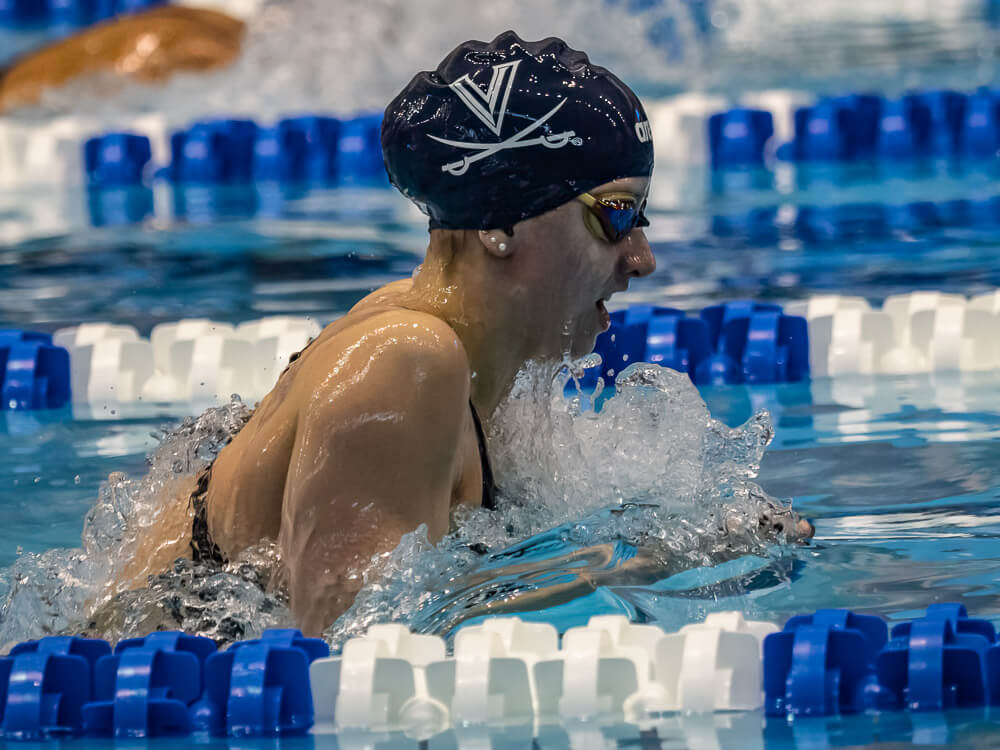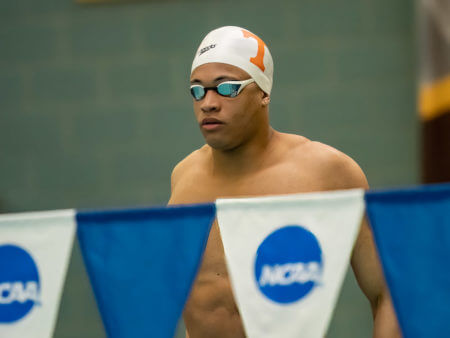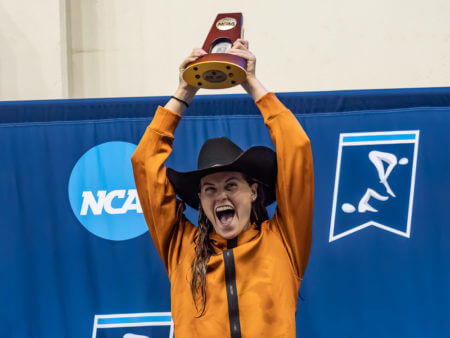NCAA Swimming to Long Course: How College Stars Could Perform in the Big Pool

NCAA Swimming to Long Course: How College Stars Could Perform in the Big Pool
With college swimming season complete after two exciting weeks of action at the NCAA Women’s Championships in Knoxville, Tenn., and the NCAA Men’s Championships in Minneapolis, the focus for the top performers from those yards meets now turns to long course. Of course, some have already aced the transition from the 25-yard tank to the 50-meter course, with Josh Liendo setting a Canadian record in the 100-meter butterfly and Maggie Mac Neil taking care of business in her events at last week’s Canadian Trials.
Plenty of the winners from the NCAA Championships are already established international performers. On the women’s side, Alex Walsh (200 IM) and Torri Huske (100 fly) were individual world champions in 2022, and Leon Marchand laid claim to the title of world’s best IMer last year. As great as was his collegiate performance, a likely attempt at the world record in the 400-meter IM later this year would be his crowning achievement so far.
But for others, their long course swimming has yet to catch up to their accomplishments on the college stage. Here are a few to watch moving into the summer:
Kate Douglass
Fresh off swimming the fastest time in history in all three of her individual events at the NCAA Championships (200 IM, 100 fly and 200 breaststroke), Kate Douglass has secured her legacy as one of the greatest college swimmers ever. But it’s still not clear where she stands in long course racing. She won bronze in the 200-meter breast at the World Championships last summer and then gold in the same event at the Short Course World Championships. But how about the 200-meter IM? Her win at the NCAA Championships in the 200-yard IM was arguably the most stunning swim of the meet as she touched in 1:48.37, and she won a short course world title in the 200-meter IM, but in long course, Douglass has not raced the event since winning Olympic bronze in 2021?
Since then, Walsh has become the world champion in the event while Summer McIntosh just became the first woman in seven years to swim under 2:07. Kaylee McKeown is a consistent international force in the race, and American teenager (and future Virginia Cavalier) Leah Hayes won bronze at Worlds last year. Douglass, meanwhile, skipped the event altogether in 2022, including at the U.S. International Team Trials. Douglass surely has more to give in the medley than her best time of 2:09.04, but can she keep up with the absurd pace set internationally? And will she even choose to re-enter the fray in an event she has admitted is not her favorite?

Jordan Crooks — Photo Courtesy: Peter H. Bick
Jordan Crooks
During his sophomore season at Tennessee, Jordan Crooks became just the second man ever to break 18 in the 50-yard freestyle, joining Caeleb Dressel in exclusive company in February before securing the NCAA title in the event in March. But just like Dressel once transformed himself from short course star to international dynamo, can Crooks make the same transition? The jury is still out. The Cayman Islands native has been great in short course meters, capturing a short course world title in the 50-meter free in December, but at the long course edition of the World Championships last year, he was 19th in the 50 free and tied for 21st in the 100 free. Capable of better? Sure — but international finalist good? Medal-worthy? Work remains.
Gretchen Walsh
Here’s another member of the Virginia women’s squad with impressive long course results on the record but not to the level of her short course stardom. Last month, Gretchen Walsh obliterated the NCAA record in the 100-yard backstroke with a 48.26, and she was just off Simone Manuel’s all-time best in the 100-yard free. In long course, Walsh had rough performances at the 2021 U.S. Olympic Trials and 2022 International Team Trials, but she bounced back at U.S. Nationals last July with a 53-second 100 free and sub-1:00 100 back, as well as strong swims in the 100 fly and 50 free. There is difference-making potential for the U.S. team, particularly in the 100 free and at least for relay purposes, so can she get herself into the 53-low or 52-high range?
Destin Lasco
Cal junior Destin Lasco posted a trio of top-three finishes at the NCAA Championships, including an American record in his runnerup finish in the 200 IM and finishing just off the fastest time ever in his winning 200 back. In an interview with Swimming World earlier this year, Lasco said, “Yards comes naturally to me. I’ve been blessed to have good underwaters, so that’s all taken care of, but for me, for long course, what I’ve been working on to improve is my tempo. I build my speed in yards off my turns, and in long course, you don’t have turns. It’s all tempo and rhythm, so that’s what I’ve been working on this past season.”
Lasco’s best chance at making inroads in long course is probably the 200-meter back, where his best time sits at 1:56.81. Breaking through in American backstroking is tough, particularly with Lasco’s Cal training partner Ryan Murphy having been atop the U.S. rankings for eight years now, but he has a chance. Additionally, Lasco has 48-second 100-meter free speed, so maybe he could find his way into the relay mix in the coming years.

Emma Sticklen — Photo Courtesy: Peter H. Bick
Emma Sticklen
Emma Sticklen gave perhaps the best celebration of the NCAA Championships when she overtook Alex Walsh at the finish to capture the 200 fly title and become the fourth-fastest woman in history. Is there a chance she can carry that momentum into long course? Maybe, especially after Sticklen has incrementally cut time season after season during her run with the Texas Longhorns, going from surprise finalist as a freshman to national titlist as a junior. In long course, the improvements have been even more stark.
In 2021, Sticklen did not earn her spot at Wave II of Olympic Trials until she finished second in the 200 fly at the Wave I meet. She topped out at 2:12.58 that year before dropping down to 2:08.88 in a fourth-place finish at the International Team Trials last year. After her short course success, a drop into 2:06-territory in long course feels possible, and that would put her in the mix among the top Americans.
Youssef Ramadan
Here is another swimmer who moved to No. 2 all-time behind Dressel in a sprint event this year, but like Crooks in the 50 free, Youssef Ramadan has yet to hit the level of his 43.15 100-yard fly in long course. At the World Championships last year, the native of Egypt finished 20th in the 100-meter fly at 52.42, just over a second short of the 51.28 required for a spot in the championship final. Ramadan did cut seven tenths in his yards swim from 2022 to 2023, so maybe there is another leap coming in long course.
Jack Alexy and Kayla Wilson
The final two swimmers on this list represent rival Bay Area schools, but both are worth watching for possible relay spots on U.S. teams as soon as this year. Cal sophomore Jack Alexy had a marvelous NCAA performance that included a 40.88 100-yard free, good enough to make him the eighth-fastest performer in history, and a 40.51 relay split. Alexy was quiet in long course last year, but he has been as fast as 48.69 in long course (at the 2021 Olympic Trials), and he ended up 10th in semifinals at that meet. By this summer’s U.S. Nationals, he will have been training under Dave Durden’s tutelage for two years, and if he can sneak into the 100 free final, all but two of those swimmers will qualify for the World Championships as relay swimmers.
Meanwhile, Kayla Wilson finished fourth in the 200 free at the NCAA Championships while recording the top time by an American swimmer at 1:42.90. And Wilson has some long course history, winning the 200-meter free B-final at last year’s International Team Trials before earning bronze in the event at the Junior Pan Pacific Championships in 1:58.42. That’s just six tenths shy of the mark required to qualify for Worlds as a relay swimmer last year, so it’s plausible she could enter the national long course mix in due course.



